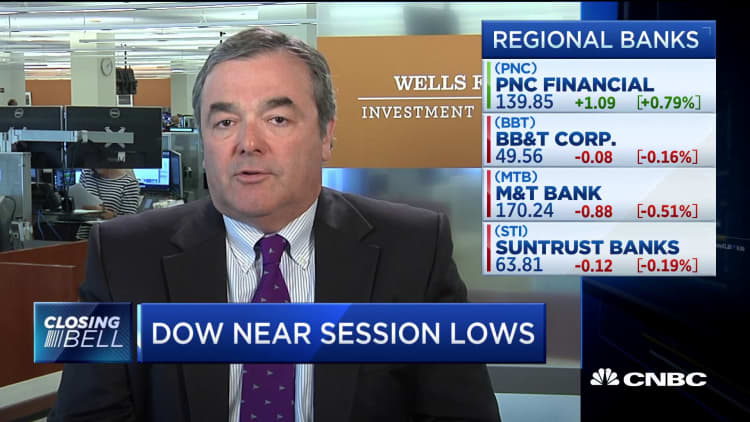Corporate earnings forecasts for the second quarter were lowered so much that companies are easily beating them, and expectations for negative profit growth are already expected to turn positive, after just the first several dozen reports.
The earnings season began this week, with 43 S&P 500 companies reporting as of Wednesday morning, and a whopping 84% beating analysts' estimates. Refinitiv's S&P 500 earnings growth forecast had been negative 0.3% at one point, but with the actual reports and forecasts for the rest of the S&P, second-quarter earnings look set to grow about 0.4%, a number that could continue to rise.
Actual reported earnings of the 9% of the S&P that have reported are up 8.8%.
"No matter what the economic circumstances are, no matter what the backdrop is, there's this dynamic that companies like to lowball and analysts like to give them headroom," said Ed Keon, chief investment strategist at QMA. "The fact that numbers are coming in better than expected — it's been the case for decades now."
The stock market, meanwhile, has traded sideways to slightly lower on thin volume this week, as earnings rolled out.
"After such a great run and the summer doldrums, I wouldn't be surprised to see a modest pullback here. I guess the way to think about it is we're a little cautious, but we think stock prices will work higher over the course of the year," said Keon.
Will the good trend continue?
The S&P 500 is up about 19.5% for the year so far, and for July, it is up 1.8% after a 7% gain in the month of June.
"I think the market should kind of digest things," said CFRA investment strategist Lindsey Bell. "Second quarter is pretty good so far. It's still fairly early in the earnings season. I think the managers are being fairly cautious as they provide guidance for the rest of the year."
But Bell said the market may not continue to take all earnings reports in stride and could sell off when industrial companies begin to report. Those companies could discuss the negative impact of trade wars on profits and revenues, like Fastenal did last week when it said its price increases could not offset higher costs.
"As we get more industrials in the next couple of weeks, I think that will create more volatility and drive the market lower in the near term. You look at CSX's end market, and its autos, chemicals and metals. Chemicals and metals are two areas where I expect pressure," she said. She added that industrials had rallied along with the market in the last month.
Railroad company CSX reported lower-than-expected profits Tuesday afternoon, and its revenues fell short, declining to $3.06 billion from $3.1 billion. Its stock plunged more than 10% Wednesday after it lowered its guidance and its CEO, James Foote, blamed its performance on economic conditions, saying, "the present economic backdrop is one of the most puzzling I have experienced in my career."
"I think you're going to see that third-quarter numbers come down and the fourth-quarter will come down. Second-quarter were lowered enough," said Bell. She noted that S&P Capital IQ is now expecting a decline of just over 1% in second-quarter S&P 500 profits, from an earlier 2% decline. "The beats from the banks have been pretty solid. I think we're going to get closer to 2 to 2.5% positive growth in the second quarter."
Tech earnings ahead
Citigroup kicked off bank earnings on Monday, followed by J.P. Morgan, Goldman Sachs and Bank of America, among others. Financial companies' earnings are now expected to grow 8.7% for the quarter, up from expectations for growth of 5.6% on July 1, according to Refinitiv.
Bell said the major banks were cautious in their guidance, particularly given the outlook for lower interest rates from the Fed.
"You look at Bank of America, J.P. Morgan cutting their net interest guidance. Even Citi said it would be a $50 million (revenue) impact in each quarter for each 25 basis point cut, so there's a real impact there," she said, adding regional banks fared better this earnings season. "I feel like banks are kind of cautious indicating with the interest rate cuts, how that's going to affect them, but it seems investors are looking at other aspects of the business."

Tech begins to report this week, with IBM Wednesday and Microsoft on Thursday. Some of the companies affected by the trade war, such as semiconductor manufacturers, have seen much lower forecasts. According to Refinitv, tech is expected to see profits fall by 7.9%.
"I think the worst might be behind us, especially for the semis. I think expectations are pretty low for the quarter. We haven't seen declines in tech since the first quarter of 2016," Bell said. "I think expectations are low going in. I think second-half numbers are going to come down a little more."
Keon said manufacturing should feel the pinch of trade friction with China and the global slowdown, but retail sales data this week showed the U.S. consumer is strong. Some manufacturing companies have already reported issues with slower growth, but profits should be strong enough overall to keep the market moving higher, albeit at a slower pace than the first half.
"There's always uncertainty, but it doesn't look like we're on the verge of a recession," he said. "It looks like manufacturing globally is going through a slump. As long as you have strong consumer demand, you're going to have solid GDP growth. If you don't have a recession, it's hard to have a bear market."
— CNBC's Juan Aruego contributed to this story.


